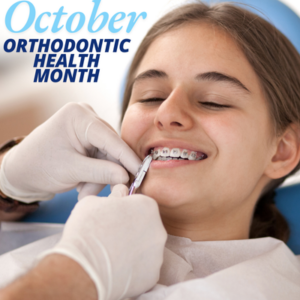Your child’s permanent teeth are starting to come in, and you get a little concerned about how they look. Is this crowding normal? Some are turned funny–does this mean anything? My child has a little trouble with chewing and cleaning. Is this normal?
Our experts tell us likely “yes.” And they cannot answer definitively till they examine your child. This is why you likely need your child to see an orthodontist.
“Children should be evaluated for need of orthodontic treatment around age seven,” says Dr. Olga M. Sanchez-Hernandez, D.M.D., M.S., M.S., of McCall Orthodontics & Pediatric Dentistry in McCalla. “Not everyone will need treatment at that age. However, at that age, most patients have a combination of primary teeth and permanent teeth that allows us to assess problems that are present and problems that will occur in the future.”
Dr. Careybeth Rivers, D.M.D., of Birmingham Orthodontics, agrees. “Children have a mix of baby teeth and permanent teeth, and your orthodontist can monitor the development of the teeth and jaws for missing teeth, extra teeth or impacted teeth,” Dr. Rivers says. “Other issues to look for include an under/overbite, crossbite or thumb/finger sucking habits.”
If you are experiencing and seeing things that concern you in your child’s mouth, it might be time to ask the dentist and consult an orthodontist.
What are some of the top signs you should see an orthodontist? Dr. Ben Samuelson of Samuelson Orthodontics in Hoover says crowding/misalignment of teeth can lead to difficulty in properly cleaning the teeth and may be a sign to see a doctor.
“If your child has teeth that are missing or not growing into the mouth, this is another possible sign,” Dr. Samuelson says. Other issues he points out are difficulty in chewing and speaking and social issues. “If your child is feeling insecure about their smile or even being bullied, this may be the time to consult with an orthodontist,” he adds.
So, what if you are late getting to the orthodontist, or you simply don’t go?
Dr. Samuelson says lack of proper function, such as effectively chewing and speaking is one possible issue. Also, ignoring the signals can lead to tooth decay or loss, as well as expensive dental procedures that could result from untreated orthodontic issues, Dr. Samuelson says.
Dr. Rivers agrees. “When a developing child has an exam, we can identify an issue before it becomes a bigger problem,” she says. “For example, correcting a crossbite in a child can decrease the potential of tooth damage for teeth involved.”
“Most existing bite problems do not correct on their own and might get more severe over time as more permanent teeth erupt,” Dr. Sanchez-Hernandez says. “There are problems that, if left unattended, can put the safety of permanent teeth at risk, prolong the presence of speech issues, cause periodontal defects, increase the incidences of [dental] caries, cause abnormal enamel wear, cause issues with mastication and contribute to problems…in the jaw [TMJ) and severely affect self-esteem,” she adds.
“Overall, [seeing an orthodontist] is a great way to simply gain information on knowing what to expect for your child. Sometimes just knowing how things are growing and developing can ultimately reduce stress and anxiety of the child and the parent, offering peace of mind,” Dr. Samuelson adds.





